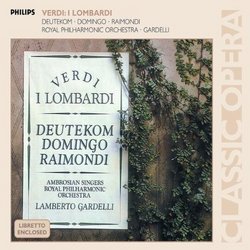| All Artists: Giuseppe Verdi, Lamberto Gardelli, Royal Philharmonic Orchestra, Christina Deutekom, Clifford Grant, Desdemona Malvisi, Jerome lo Monaco, Keith Erwen, Montserrat Aparici, Plácido Domingo, Ruggero Raimondi, Stafford Dean Title: Verdi: I Lombardi Members Wishing: 0 Total Copies: 0 Label: Philips Release Date: 8/14/2007 Genre: Classical Style: Opera & Classical Vocal Number of Discs: 2 SwapaCD Credits: 2 UPCs: 028947587002, 028947587002 |
Search - Giuseppe Verdi, Lamberto Gardelli, Royal Philharmonic Orchestra :: Verdi: I Lombardi
 | Giuseppe Verdi, Lamberto Gardelli, Royal Philharmonic Orchestra Verdi: I Lombardi Genre: Classical |
Larger Image |
CD Details |
CD ReviewsRip-roaring early Verdi Ralph Moore | Bishop's Stortford, UK | 07/13/2010 (4 out of 5 stars) "A little over a year separates this, Verdi's fourth opera (1843) and "Ernani", his fifth (1844). Both have always been successful but to me there seems to me to have been more development in Verdi's style and skill than so short an interval would normally permit. There is an assurance and unity about "Ernani" that eludes him in "I Lombardi" which, for all its brilliance and energy, remains a patchy work. Of course, it contains some great arias and the customary stirring trio at the end of Act 3, but its more than usually absurd plot and restless jumping from one short scene to another create a fractured impression. It is of course one of the series of patriotic operas penned by Solera, gratefully seized upon by the Italian public, and attempts an uneasy blend of chauvinism and piety - not to mention Giselda's miraculous supernatural vision at the beginning of Act 4; no wonder Verdi dropped this slightly embarrassing scene when he re-worked the opera as "Jérusalem" for Paris in 1847.
As ever, Solera is more concerned to generate situations affording dramatic confrontation and impact than to achieve subtlety or verisimilitude and Verdi revels in the sequence of opportunities thereby afforded. Some of the music really is of the worst rum-ti-tum-oompah-oompah variety yet there are also lovely numbers, such as Oronte's famous "La mia letizia infondere". That aria is sung very nicely here by a young, sappy and limber Domingo (in his puppy-fat stage according to the photos!) but he does not erase memories of Carreras's account of that aria in his first recital record in 1977 conducted by Roberto Benzi or of Pavarotti in his prime; both achieve more passion and plangency of tone. Nor are Domingo's co-stars to everyone's taste: Deutekom's thin tone and rapid vibrato can give her voice a somewhat gargling effect but she floats some lovely pianissimi and is certainly more vibrant and involved than Domingo, whose characterisation is a little all-purpose-melancholy generic, despite its sheer beauty as singing per se. Raimondi is at his best here, his sonorous, rather lugubrious sound not inappropriate to the dour, sombre Pagano. It is an oddity that the there is no true baritone or mezzo role in this opera - though there there are three basses (Pagano being more of a bass-baritone, I suppose), three tenors and three sopranos. This recording was of course the first in the eight operas which eventually constituted the (unfinished) Early Verdi project conducted by Lamberto Gardelli. It is now almost 40 years old, yet it has not yet been bettered and is unlikely to be so." |
